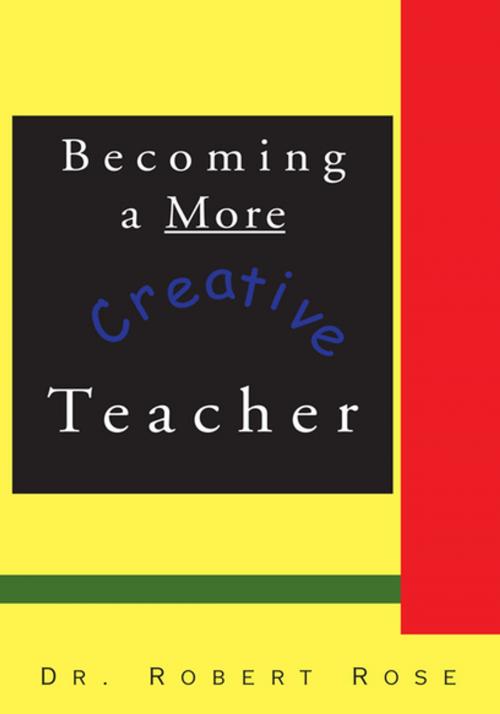Becoming a More Creative Teacher
Nonfiction, Reference & Language, Education & Teaching, Teaching, Teaching Methods| Author: | Dr. Robert Rose | ISBN: | 9781462831593 |
| Publisher: | Xlibris US | Publication: | October 5, 2000 |
| Imprint: | Xlibris US | Language: | English |
| Author: | Dr. Robert Rose |
| ISBN: | 9781462831593 |
| Publisher: | Xlibris US |
| Publication: | October 5, 2000 |
| Imprint: | Xlibris US |
| Language: | English |
How does a teacher become a more creative teacher?
In THEY TOUCHED MY LIFE I demonstrated through the events as teaching stories what I considered the characteristics and behaviors necessary for being an effective teacher. I portrayed a situation, explained what I did, and then I offered brief comments about what I learned.
Besides entertaining you, I hoped to show you what teachers and children face in their daily efforts to survive in an environment that is too often traumatic and frustrating. In many of the stories I did things which were inept and visceral responses that I would not do now. Partly because the laws and policies have changed to meet the changing times, but more because much more is known about the physiological and psychological causes of human behavior.
We know from evolution that most species changes occur over long periods. There are many notable exceptions, but none would give validity to statements about how different children are now as compared to forty years ago. Especially when these changes are made to appear as if there have been modifications in the physiology of children. I think a structural analysis and comparison of children from that era to now would prove there are no major physical differences There have been dramatic changes in technology and in the power relationships between individuals and groups and within countries as well as between countries. The rights of racial, religious, and ethnic groups as well as for women and children has given many children the belief that what each child wants is more important than his role in the group.
This has made the old coercive methods of control less effective. Good teachers now must rely more on persuasive techniques and rewards instead of fear and punishment. However, coercion and persuasion are two sides of the same coin, which is control. You saw in Touch how I struggled to develop a method, which was based on mutual respect. I failed time and again because of my lack of knowledge of how to make this alternative to punishment work and because of the very different expectations of my administrators. Further, the administrators were raised to respond to fear and then they were trained to use fear and intimidation upon teachers as well as students and parents, so they were not receptive to any changes which gave autonomy to the teacher and encouraged real independence and choice for children.
(In November of 1980 a kindergarten teacher spent an hour in my first grade room with children she had known from the previous year. While we spoke children occasionally came over and asked me a question, but basically the class ran itself. They knew what they had to do and they knew where to get help from others or resources in the room. When they were done they could have earned time to draw, paint, read, or play games. They were independent. She was amazed because she had seen them behave like babies all year with their previous teacher. The principal, a sensitive and bright woman had asked me, to salvage them, which I had done.)
People raised to believe that coercion is necessary to motivate children see mutual respect as weakness and ineffectiveness. In one anecdote a different principal only noticed the noise in my room and completely missed the intellectual excitement as the children and I argued and shouted out ideas about what constituted a living thing as opposed to an inanimate object. Later, I was given a lecture from her about not following my lesson plan as well as losing control. She had no clue that the class and I were experiencing Socratic education at its highest level. All she could see was that I had gone over the twenty minutes for science as stated on my lesson plan, which meant to her that I had cheated them of twenty-five minutes of their language t
How does a teacher become a more creative teacher?
In THEY TOUCHED MY LIFE I demonstrated through the events as teaching stories what I considered the characteristics and behaviors necessary for being an effective teacher. I portrayed a situation, explained what I did, and then I offered brief comments about what I learned.
Besides entertaining you, I hoped to show you what teachers and children face in their daily efforts to survive in an environment that is too often traumatic and frustrating. In many of the stories I did things which were inept and visceral responses that I would not do now. Partly because the laws and policies have changed to meet the changing times, but more because much more is known about the physiological and psychological causes of human behavior.
We know from evolution that most species changes occur over long periods. There are many notable exceptions, but none would give validity to statements about how different children are now as compared to forty years ago. Especially when these changes are made to appear as if there have been modifications in the physiology of children. I think a structural analysis and comparison of children from that era to now would prove there are no major physical differences There have been dramatic changes in technology and in the power relationships between individuals and groups and within countries as well as between countries. The rights of racial, religious, and ethnic groups as well as for women and children has given many children the belief that what each child wants is more important than his role in the group.
This has made the old coercive methods of control less effective. Good teachers now must rely more on persuasive techniques and rewards instead of fear and punishment. However, coercion and persuasion are two sides of the same coin, which is control. You saw in Touch how I struggled to develop a method, which was based on mutual respect. I failed time and again because of my lack of knowledge of how to make this alternative to punishment work and because of the very different expectations of my administrators. Further, the administrators were raised to respond to fear and then they were trained to use fear and intimidation upon teachers as well as students and parents, so they were not receptive to any changes which gave autonomy to the teacher and encouraged real independence and choice for children.
(In November of 1980 a kindergarten teacher spent an hour in my first grade room with children she had known from the previous year. While we spoke children occasionally came over and asked me a question, but basically the class ran itself. They knew what they had to do and they knew where to get help from others or resources in the room. When they were done they could have earned time to draw, paint, read, or play games. They were independent. She was amazed because she had seen them behave like babies all year with their previous teacher. The principal, a sensitive and bright woman had asked me, to salvage them, which I had done.)
People raised to believe that coercion is necessary to motivate children see mutual respect as weakness and ineffectiveness. In one anecdote a different principal only noticed the noise in my room and completely missed the intellectual excitement as the children and I argued and shouted out ideas about what constituted a living thing as opposed to an inanimate object. Later, I was given a lecture from her about not following my lesson plan as well as losing control. She had no clue that the class and I were experiencing Socratic education at its highest level. All she could see was that I had gone over the twenty minutes for science as stated on my lesson plan, which meant to her that I had cheated them of twenty-five minutes of their language t















